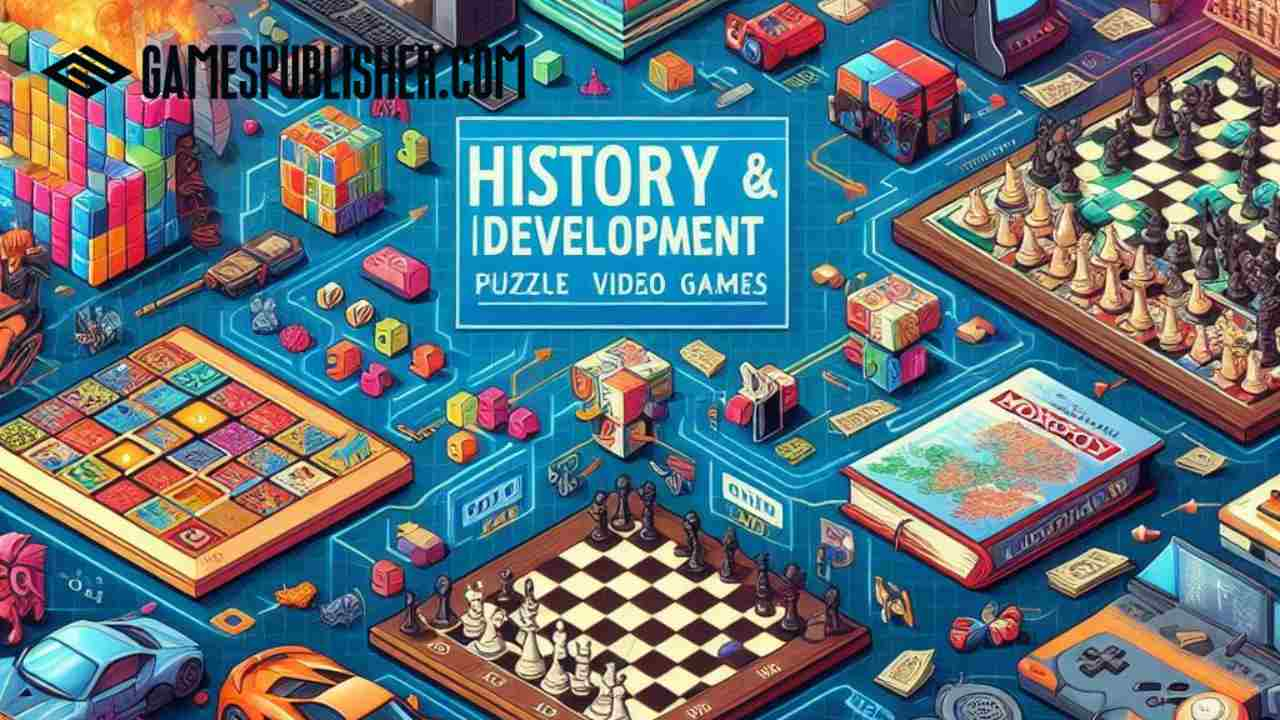Welcome to Gamespublisher.com, your leading reference in the video game industry. This article delves into the fascinating puzzle of video games, exploring their evolution and impact on modern game development.
Have you ever wondered when these genres first appeared in the digital realm? Who were the pioneers that brought these games to life? How have board video games evolved, and what key trends have shaped their development?
Understanding this history can inspire your work, whether you’re a game developer or a publisher.
So, let’s find out in this article!
The Origins of Puzzle and Board Video Games
There are so many different kinds of gaming genres, and puzzle and board video games especially take a special place because they offer challenge, strategy, and entertainment in a unique mix.
So, where did these genres even come from? How did they become the digital experiences that we love today?
Early History of Puzzle Games (1970s-1980s)
In the early years of gaming, the first puzzle video games appeared, challenging technology and captivating players with their new, weird gameplay.
The first of them was Spacewar! (1962), a space battle simulation that allowed you to outmaneuver opponents with your strategy.
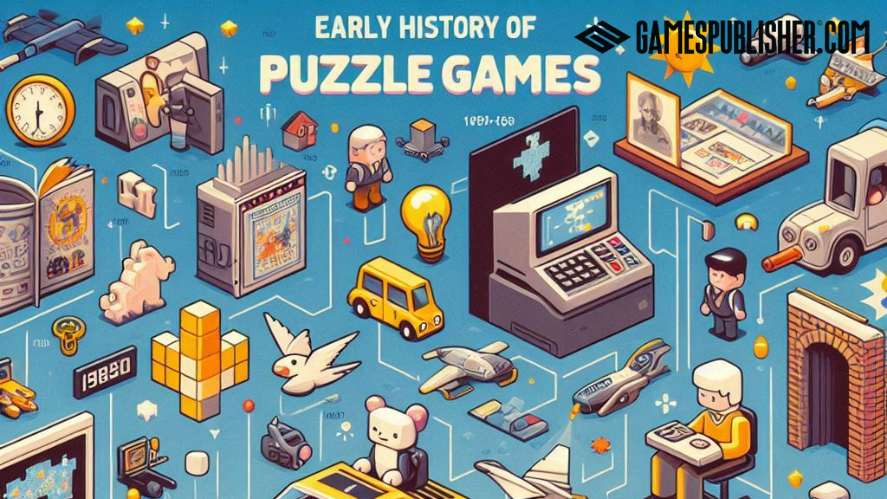
However, due to the technological limitations of the time, the gameplay of many puzzle-based games was decided by abstract and strategy-based gameplay.
Then Tetris (1984) was born and captured audiences with its simple Tetris tile-matching mechanics.
Besides, while not strictly puzzle video games, Pong and Breakout were also hugely influential, laying the groundwork for future innovations in the genre.
The Transition of Board Games to Digital Platforms (1980s-1990s)
The 1980s and 1990s ushered in the rise of personal computers and gaming consoles, resulting in the digitization of classic board games.
Chess and Checkers were among the first to make the crossover from the real world to the digital, even developing both online and via mobile, providing people with new ways to experience chess and checkers.
Infocom and Sierra On-Line adapted board games to video game formats, allowing classic tabletops to reach a wider audience.
In many ways, this transition was driven by some factors, such as the rising accessibility of personal computers and a desire to simulate multiplayer experiences without the need for physical boards.
Early Pioneers and Innovators in Puzzle/Board Video Games
Puzzle and board video games would never have existed without the pioneers who dared to push the boundaries of what a typical game could be.
Their vision laid the foundation and drove the development of puzzle and board games today.
Now, let’s take a closer look at some of the key companies involved in the early development of board video games.
Alexey Pajitnov and the Creation of Tetris (1984)
In 1984, Alexey Pajitnov, a talented Russian software engineer, while experimenting with different programming challenges, created Tetris.
Inspired by a classic puzzle game called Pentominoes, a seemingly simple yet incredibly addictive game with its tile-matching mechanics and endless was born and quickly became a global phenomenon.
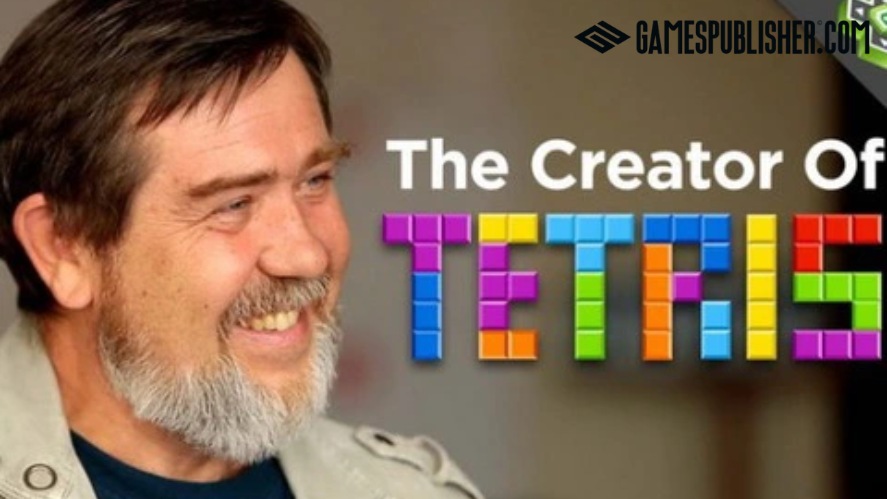
Beyond its role as a puzzle game icon, the game’s popularity exploded further when it was bundled with the Nintendo Game Boy.
Its success demonstrated the immense potential of the puzzle genre and inspired countless developers to explore new and innovative ways to challenge players’ minds.
The Role of Atari and Nintendo
Atari, a pioneer in the arcade gaming world, played a crucial role in shaping early puzzle game design.
Many of their popular titles, such as Pong and Breakout, were not pure puzzle games; both incorporated puzzle-like elements that required players’ reflexes and strategic thinking.
However, these games laid the foundation for future puzzle game development, demonstrating how simple mechanics could create engaging and addictive experiences.
On the other hand, the rise of puzzle games is partly due to the significant contribution of Nintendo’s Titles like Dr. Mario.
It unites puzzle-solving with action, providing a fun and exciting game for players of all types. They also integrate puzzle elements into their top franchises, like The Legend of Zelda.
Nintendo has proven that incorporating puzzles into world exploration can create more engaging challenges for players.
With this approach, they have established puzzle gameplay as a core element in many different game genres, from adventure to RPG.
Digital Board Game Developers and Their Impact
Digitalizing video game boards has created many exciting discoveries for players and game developers.
Westhood Studios is one company that really sees the potential when bringing classic board games to digital platforms.
Their adaptations of popular titles like Monopoly and Risk have helped reach a wider audience. They eliminate the need for physical components and allow for online multiplayer.
However, as board games became digital formats, they faced many challenges translating the tactile and social parts to the digital realm.
Additionally, they also experimented with different user interfaces, AI opponents, and online multiplayer features, creating exciting gaming experiences today.
Their efforts not only expanded the gameplay of classic board games but also helped create a booming digital iterations market that is still being made today.
The Evolution of Puzzle and Board Games in Video Game History
The digital journey of puzzle and board games has been a history of evolution, adjusting to technological advances and player trends.
These genres have been constantly revving along, right from the days of arcade games to the golden age of mobile gaming and even online platforms.
The Rise of Puzzle-Platformers and Casual Puzzle Games
The puzzle mechanics built into the game create challenges for players both mentally and physically.
Games such as The Lost Vikings and Portal had players figuring out challenging puzzles and mulling through innumerable intricacies of an environment for the brainteasing gameplay experience it provided.
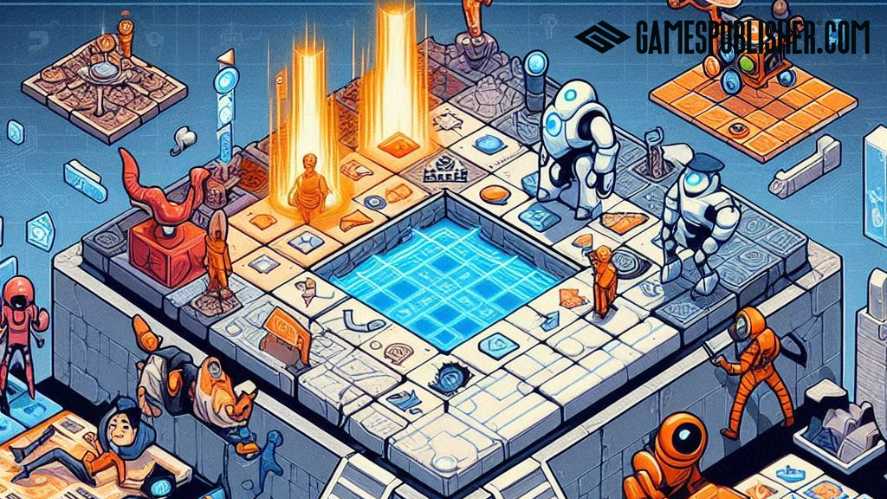
Moreover, the rise of casual gaming in the 2000s brought puzzle games and video games to an even wider audience.
Titles like Bejeweled (2001) and Candy Crush Saga (2012) captivated millions with their simple yet addictive gameplay, accessible on mobile platforms and social media.
As a result, these games demonstrated the broad appeal of puzzle mechanics and their ability to transcend traditional gaming demographics.
Board Game Renaissance in the Digital Age
The digital board game adaptation boom at the beginning of the 2000s coincided with the resurgence of physical board games.
Additionally, platforms like Steam and mobile app stores became havens for digital versions of popular board games like Catan, Ticket to Ride, and Carcassonne. As you know, they are one of the best puzzle games on Steam.
Furthermore, these digital adaptations offered numerous advantages, including online multiplayer modes, AI opponents, and automated rule enforcement.
Thus, classic board games have been more accessible to a global audience, allowing them to connect and play with any other person, no matter where they are.
The convenience and accessibility of digital platforms fueled board game’s continued growth and evolution in the digital age.
Puzzle video games have quickly evolved to encompass a wide range of different, from challenging puzzles to mobile hits and digital adaptations of classic board games.
This genre of games has stood the test of time and proven its worth in the ever-changing gaming industry.
Puzzle/Board Video Games in Modern Game Development
The influence of puzzle and board games extends far beyond their respective genres.
Modern game development has embraced the core elements of these classics, integrating them into a diverse range of gaming experiences.
From enhancing immersion to providing strategic depth, puzzle and board game mechanics continue to shape the interactive entertainment landscape.
Puzzle Game Mechanics in Contemporary Games
Modern game developers were able to seamlessly integrate puzzle mechanics into many genres, heightening gameplay experiences and making them fantastic to play.
For example, puzzles can be used in role-playing games (RPGs) to unlock hidden areas and move stories along as a challenge by providing a puzzle that tests everyone’s problem-solving skills.
Similarly, action games often incorporate puzzle elements to break up combat sequences, add variety, and encourage strategic thinking.
Moreover, these puzzles create impressive moments for players, such as solving codes or completing simple challenges to achieve specific goals.
This integration fosters a sense of accomplishment and recognition among players as they conquer complex challenges and demonstrate their skills to others.
Digital Board Games and the Shift to Mobile and Online Platforms
Board games have rapidly undergone a sea change in the digital realm.
There are increasingly sophisticated mobile and online versions of classic board games being created by developers, where you can play competitively against other people across the world.
These digital adaptations often have increased visuals, interactive tutorials, and automated rule enforcement, making for a wider audience.
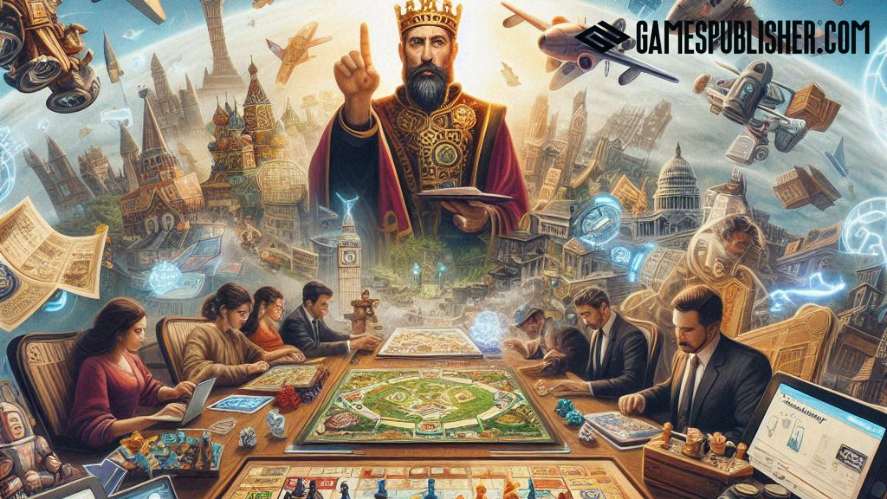
Due to technological progress over the last decade, we have entered the period of digital board game development with additional features like asynchronous gameplay, social features, and more.
These innovations have increased the growth and popularity of digital board games, allowing players to connect and compete with others worldwide in new and exciting ways.
Artificial Intelligence and Puzzle Game Design
Artificial intelligence (AI) is a new turning point for developing video games and board games for game developers.
Using algorithms and AI, game developers can make more intelligent and more challenging opponents suitable for each player’s skill and gaming experience.
In puzzle games, AI can generate logical levels that feel comfortable to the player but are also filled with entirely different challenges each time they play.
Furthermore, developers are using machine learning to understand how players behave and what they like so they can create adaptive puzzle games based on individual players, adjusting in difficulty and challenge.
This personalized approach heightens engagement for casual and professional puzzle enthusiasts, helping them not be bored when the game is too easy or hard.
Puzzle and board games still impact modern game development. The integration of puzzles in different genres has shown their continued prominence and influence.
Given how fast technology will continue to progress and players’ needs will only get bigger, we can expect the application of puzzle and board game elements to become even more inventive and exciting going forward.
The Legacy and Future of Puzzle/Board Video Games
The enduring appeal of puzzle and board games is a testament to their timeless design and engaging mechanics.
Even decades after their creation, classics like Tetris, Myst, and early digital adaptations of board games continue to inspire and influence modern game development.
As we look ahead, the future of these genres promises even more exciting innovations and captivating experiences.
The Lasting Impact of Early Puzzle/Board Games
Tetris and Myst shaped and set the benchmark high for what a puzzle game could be. You can see their influence in many modern games, from indie puzzle titles to AAA blockbusters.
Besides, there has also been a run of re-makes. Spiritual successors have brought these classics to new generations of players and maintained a timeless game genre.
Similarly, early digital game board game adaptations led to a thriving market. They showed that classic tabletop experiences have the potential to reach digital platforms with convenience, accessibility, and a new degree of gameplay.
The legacy of these early adaptations inspires people to break their limits. Now, most game developers still adopt these previous adaptations and continue their digital board game design.
The Future of Puzzle and Board Video Games
New technologies like Virtual Reality (VR) and Augmented Reality (AR) will revolutionize this gaming genre. They bring immersive and interactive experiences, erasing the boundaries between the real and virtual worlds.
Imagine playing a virtual board game with friends from around the globe or solving intricate puzzles in a 3D environment that surrounds you. So puzzle and board video games are full of exciting possibilities that will be revealed in the future.
Besides, with the help of AI, game developers can set up to come up with countless different variations of puzzles and gameplay. This will personalize the gaming experience for each gamer, catering to the preferences of all game participants.
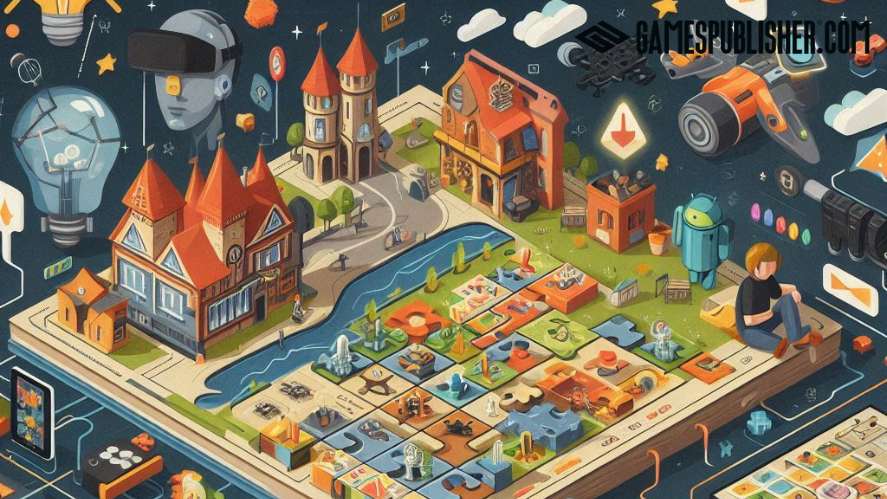
Furthermore, we can anticipate a fusion of more genres, with puzzle elements appearing in more diverse game types.
The possibilities are endless, from action-adventure games with intricate puzzle-solving sequences to RPGs with challenging logic puzzles. The combination will yield more prosperous and more exciting gameplay experiences.
Puzzle and board video games have a rich history and a bright future. Their appeal lies in their ability to challenge our minds, encourage strategic thinking, and provide captivating entertainment.
Incredible technological developments, especially in creativity, are set to become more commonplace. It will continue to captivate and inspire generations of players coming continually.
Conclusion
From the simple brilliance of Tetris to the rise of immersive digital board games, puzzle and board games have continuously evolved, leaving a lasting impact on game development.
These genres have pushed the boundaries of creativity, teaching us valuable lessons in design, engagement, and the power of a good challenge.
Consider how these mechanics can elevate your projects. Whether you’re crafting dedicated puzzle experiences or weaving these elements into other genres, the possibilities are endless.
With VR, AI, and mobile platforms driving innovation, the future of puzzle and board games promises even more engaging and immersive experiences.
Follow Gamespubliser.com to update the latest knowledge and information in the game industry to develop your successful game project.
Loading survey...

